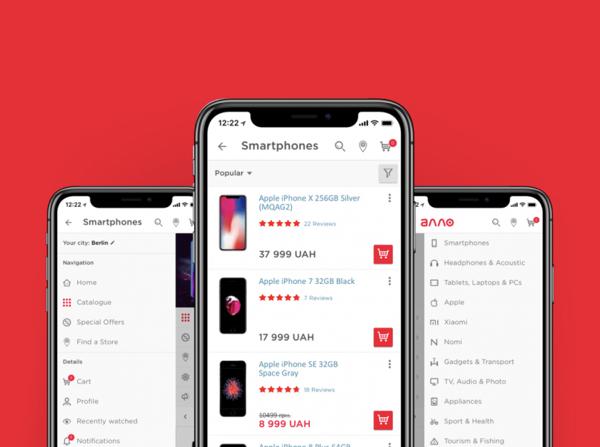Mobile Apps For Business Processes
Mobile apps have taken the world by storm. The boom has been rapid, impactful, and changed the way we work. Intelligent, successful businesses have caught on and are organizing their processes via apps. The future is now.
Enterprise application integration is easily one of the most important and talked about technology shifts happening today. You can create a web application for your business, but mobile apps are a completely different game.
They are changing how people interact and consume online, and businesses communicate internally to keep up with the fast pace of things.
In this article, you’ll learn how mobile apps improve business processes and the use cases for mobile applications in business.
Business processes that can be enhanced by mobile applications
Generally, there are two types of business processes: internal and external.
External processes are related to the customers and include marketing, sales, communication, providing support, retaining customers, building loyalty, shipping goods, providing services, and so on.
There are internal and external business processes, and mobile apps can help you with both: from organizing your staff and optimizing business operations to providing services to your customers and generating revenue
Internal processes include everything that happens inside your organization that allows you to provide customers with services or products. This includes, for example, internal communication, staff management, human resources, recruiting, employee training, inventory management, finance management and so on.
Mobile applications can help you facilitate both processes. Let’s find out how they can help you build, enhance and optimize your internal and external business processes.
How mobile apps can revolutionize your business processes
There’s probably no business process in which a mobile application can’t help. Let’s look at what you can achieve with a mobile application integrated into your operations. We’ll start with external purposes.
Increase customer engagement
Attention is the new currency, and engaged users mean loyal users that spend more money with a particular brand. You can significantly increase your customer engagement by using all the possibilities of a custom mobile app.
For example, you can gamify your user experience and create new ways to connect with your customers. A good example is the famous AR app from IKEA, which allows users to put furniture into their homes through their mobile cameras virtually.
Aliexpress app also uses this strategy by creating engaging games: by playing them, users can get discounts for their purchases.
A less extreme and expensive example of this is simply sharing content connected with what you sell. For example, if you sell kitchenware, your mobile app can engage users with video recipes and other related content.
Open access to new markets
Mobile presence can open you to a new audience that prefers to communicate with businesses through mobile applications. These people are usually among younger generations like Millennials and Gen X, who predominantly use smartphone apps to discover products, make purchases, and receive services.
Having a mobile application can widen your current customer base and help you increase your presence on the market.
Build a loyal customer base
Mobile app users make loyal customers. There’s a huge difference between just visiting a website and installing an app on your smartphone and making it a part of selected programs you see daily.
If you manage to engage your users and decrease the churn rate, you can build a truly loyal customer base and have more ways of communicating with them.
Improve communication with the help of push notifications
Push notifications are one of the most effective means of communication with mobile users. They allow you to remind users of your app, notify them about special offers, and connect them with other users.
Push notifications are one of the best ways to connect with your customers
Notifications reach users easily, and there are many ways to make them more effective. For example, you can send geo-targeted notifications that appear on your users’ screens when they’re in a certain area (for example, near your physical store).
Collect valuable data about your customers
Website cookies will never give you the amount of data you can get from mobile applications. Precise location, behavior, preferences, demographics, device model, OS version, and hundreds of other data points are available in mobile analytics.
What do you need this data for? Read along.
Make marketing campaigns more personalized and increase conversion
The data collection I mentioned above is valuable when you apply it to your marketing strategy. It allows you to divide your audience into segments based on their demographics, behavior, preferences, or a stage in their buyer journey.
You can create a suitable message that will resonate with a particular segment or program certain trigger-based actions. For example, send your user notification about a discount for a particular product they were interested in.
This segmentation and personalization results in increased conversion and, consequently, higher revenue.
Win the competition
Businesses with mobile presence win the game, and that’s just fact. Although the web platform is still significant, people use their mobile devices for everything.
If your competitors don’t have mobile apps yet, it’s a great chance for you to win over your audience. If your competitors already offer mobile apps to their customers, it’s high time you do the same and offers your customers more.
Provide better customer support
With mobile apps, your users can easily share issues and get support anytime, anywhere. For example, insurance companies allow users to take photos of the damage on their mobile phones, attach receipts, and send claims without visiting an office or even calling an insurance agent.
You can also enhance your customer support with the help of chatbots that will answer general questions at any time, leaving your support team to work on more complex issues.
Now let’s move to the internal purposes of mobile applications for businesses.
Make internal communication effective and facilitate remote work
Remote work has become a reality for most businesses worldwide, and the demand for communication tools will only rise. Mobile devices allow users to connect whenever and wherever they want through text, video, and audio channels.
With mobile apps, you can collaborate with your partners and colleagues on documents, brainstorm remotely, and organize your workflow. Cloud-based apps allow you to update information once for all users, notify them of changes, and more.
Increase employee productivity
Mobile applications allow your employees to complete tasks faster with the help of smart planning, automation, and shared access.
For example, mobile apps are widely used in inventory management. Previously, employees needed to track all the inventory on paper and manually enter this data to the PC. With mobile apps, they can simply scan the barcodes, and the information will be added to the system automatically.
Run cost-effective marketing campaigns
Mobile applications for marketing can help you get an overview of all your social media channels, their efficiency, and their cost. For example, tools like Hootsuite help you to create a social media marketing strategy and get an insight into how well your marketing activities perform.
Effectively manage staff
It’s easy to get lost in tasks, especially when you have dozens of different processes like client projects, finances, marketing, sales, business development, and so on. Mobile applications can help you manage the processes in your team, assign and track tasks, and complete projects on time.
Jira is one of the most popular projects management tools, but staff management doesn’t end there. There are tools for separate tasks, for example, HR apps that facilitate the hiring process, employee training, communication, and more.
Manage and regulate the working environment
Mobile applications can help you manage your office space, organize and track inventory, and ensure a convenient hybrid workspace. For example, with a mobile app, your employees can book desks or conference rooms for certain periods, so they always have access to the space they need for work and communication.
You can also pair your mobile app with IoT devices and regulate the environment in your office, warehouse, lab, or any other location.
Types of mobile apps for business
There are different classifications for mobile apps for businesses. As I already stated, there are two main types of apps for businesses: internal and external. Another classification includes custom-made and third-party SaaS apps.
Most businesses use SaaS solutions to optimize their internal operations because corporate mobile apps for business processes are usually quite complex and expensive to develop.
Businesses prefer to pay yearly or monthly to get access to a high-quality product that helps them optimize their business processes. So, if you’re planning to create a SaaS B2B business, the demand is definitely there.
Large companies with sufficient resources create internal corporate applications of their own. For example, we at Mobindustry have experience in building a secure internal corporate chat with end-to-end encryption. Our client didn’t want to use a third-party app to avoid data leaks.
Custom application development is more popular for external, customer-facing apps. With custom development, a business can build its relationships with customers exactly as they see fit and have full control over its main sales channel, which a mobile app often is.
Great examples of mobile apps improving businesses
We at Mobindustry strive to improve both the internal and external operations of our clients’ businesses and help them be more competitive, increase revenue and conquer new markets.
Let’s look at the projects we completed, discuss the benefits of mobile apps for businesses on concrete examples, and look at the practical use of mobile applications in business.
Allo — a customer-facing ecommerce platform
Allo is a large Ukrainian ecommerce company that sells electronic products. It has over 250 physical stores and a web platform for online shopping. Five years ago they decided also to create a mobile application, as their competitor started working on their apps as well.
The initial plan was to duplicate the functionality of a website completely, but we suggested a different approach that would consider the preferences of a mobile audience.
We implemented mobile-specific features like:
- Geolocation-based notifications that would alert users about special offers in nearby stores
- Instant payments through a mobile payment processor that would help increase sales and make the shopping experience smoother
- Gamification that increased the engagement and became a part of a loyalty program
- Deep links that would direct users to an item promoted through push notifications
A mobile app also allowed our client to collect valuable data about customers and use it in their marketing and promo campaigns.
ContractsRX — a SaaS platform for contract management
ContractsRX is a B2B SaaS platform we helped our client create. Its main idea is to help other businesses to manage, store, assess, and share their contracts. This helps to automate internal operations that concern contracting and optimize business collaboration.
This product started as a single tool that used algorithms that compare contracts, identify risks and eliminate human contracting errors. Then, we helped our client to turn this into a fully-fledged SaaS platform that now helps businesses to:
- Create contracts and contract templates
- Share contracts and give access to editing to business partners, even if they’re not ContractsRX users
- Assess contract risks and overall deal health
- Store all contracts and documents in one place
- Easily search for documents and contracts
- Collect payments for contracts
Now, ContractsRX is one of the best enterprise mobile apps to consider for your company.
A logistics calendar for optimizing internal operations
This is an internal tool for a logistics company that’s the main goal is to automate operations and improve the communication between a warehouse, delivery people, and receivers.
This mobile application’s main features were speech and written text recognition, as workers were used to keeping track of their shipments on paper. We also synchronized the calendar with a corporate messenger and a CRM so that every supply chain member is on the same page.
This logistics calendar helped our client facilitate all delivery stages and make it more efficient and predictable. We used the latest technologies and added:
- Delivery time estimation
- Traffic conditions monitoring
- Integration with CRM
- Push notifications
- Geolocation tracking
- Shipment history
- Document access
- Calendar interface
- Shipment status
All the information about each shipment was shared across the system, so that everyone was on the same page.
Why you need a mobile app for your business
Mobile applications have endless possibilities to improve your internal operations and external communication with your customers on all levels. Unlike websites, mobile apps have unique abilities due to their hardware elements like cameras, microphones, and geolocation trackers, as well as software abilities like augmented reality.
We at Mobindustry are fascinated by technologies, but we always look for practical business applications for particular goals and cases. If you’d like to expand your audience, improve your service or build a mobile product, don’t hesitate to contact us.
We provide IT consulting, business consulting, planning, competitor analysis, market research, and all types of mobile development services to ensure your project succeeds, reaches the right audience, or improves your internal operations.




